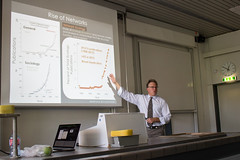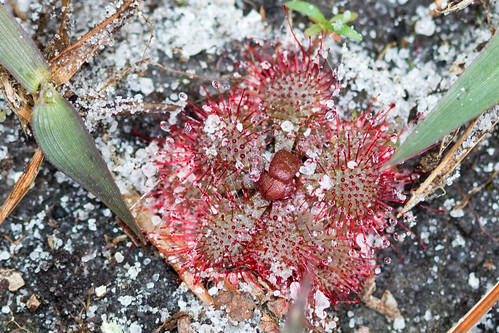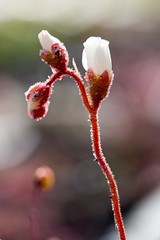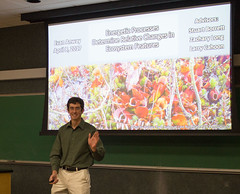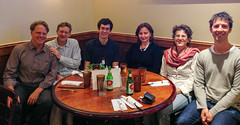Stuart Borrett |
|||
|
Stuart R. Borrett is a systems ecologist, professor, and academic leader whose work explores how ecological and organizational systems form, persist, and adapt. He serves as the Associate Provost for Research and Innovation at the University of North Carolina Wilmington, where he leads efforts to strengthen the university’s research culture, support the success of students, faculty, and staff, and build partnerships across disciplines and communities. His scholarly background is in ecological network analysis, ecosystem modeling, and environmental data science, and he continues to engage in collaborative research and professional service within the systems ecology community. As a long time educator and mentor, he has taught and supervised students at all levels and is committed to helping them develop curiosity, creativity, and confidence in scientific problem solving. Dr. Borrett is also deeply engaged in service to both the scientific community and the broader public. He serves on the editorial board of Ecological Modelling, contributes to alumni leadership as a member of the Odum School of Ecology Alumni Board at the University of Georgia, and supports regional science education and outreach through the Cape Fear Museum of History and Science Associates Board. He is also involved locally as an assistant coach for the Cape Fear Fins youth mountain biking team, working to build confidence, health, resilience, and connection to the outdoors. Across these roles, he seeks to strengthen connections among researchers, educators, students, and community partners, and to promote the public understanding and value of science, research, and innovation. He is dedicated to fostering inclusive, collaborative, and curiosity driven environments where people and ideas thrive.
LINKS: CV :: Google Scholar :: ResearchGate :: LinkedIn :: Flickr :: BIO CONTACT: borretts (at) uncw (dot) edu
|
||
| Could be You | |||
Dr. Borrett is looking for new intellectually curious graduate students who want to work on interesting ecological problems. Opportunites exist for modeling the Cape Fear River Estuary Food web, investigating the aquatic ecosystem in purple pitcher plants, and extensions and applications of Ecological Network Analysis. |
|||
| Could be You | |||
Dr. Borrett is looking for new intellectually curious undergraduate students who want to work on interesting ecological problems. Opportunites exist for modeling the Cape Fear River Estuary Food web, investigating the aquatic ecosystem in purple pitcher plants, population studies with Sundews (photo), and extensions and applications of Ecological Network Analysis. Dr. Borrett is also looking for a students to with coding skills to work on the development of the our R package for Ecolgical Network Analysis (enaR, see Borrett & Lau 2014). |
|||
| Dr. Michael Freeze | Mathematics and Statistics @ UNCW |
||
 |
Fields of Interest Algebraic Number Theory, Additive Number Theory Other Interests Artificial Language, Memetics, Evolutionary Algorithms, Baroque Music |
||
| Dr. Zach Long | Biology and Marine Biology @ UNCW | ||
 |
Dr. Long combines theoretical and experimental approaches to investigate how interactions among species allow for or prevent their coexistence, and how the number and identity of coexisting species (i.e., diversity) influences the collective performance or functioning of ecosystems. |
||
| Matt Lau | Postdoc @ Harvard Forest | ||
 |
I am broadly interested in issues related to complex systems, i.e., systems whose macro-scale behaviors cannot be predicted from microscopic (reductionistic) analysis of the system components, and how we can use complex systems approaches to address community ecology problems. Currently, I am investigating how variation within species affects the relationships among many species in species rich communities. In particular, I am interested in how genetics can predict the structure of interactions among associated communities. Toward this end, I am using quantitative modeling techniques to construct networks of species relationships. Matt's PhD advisor was Dr. Whitham at NAU. |
||
| Tony Kauffman | BS Marine Biology 2009 |
||
 |
Tony completed his honors thesis in the laboratory investigating the impact of data uncertainty on the results of Ascendent Perspective of Ecological Network Analysis. The results of his thesis is published in Ecological Modelling. He is now a M.S. candidate at the University of Maryland. Kaufman, A., S.R. Borrett. 2010. Ecosystem network analysis indicators are generally robust to parameter uncertainty in a phosphorus model of Lake Sidney Lanier, USA. Ecological Modelling 221: 1230-1238. http://dx.doi.org/10.1016/j.ecolmodel.2009.12.018 |
||
| Sarah Fann | BS Marine Biology and Statistics 2010 |
||
 |
Sarah completed her honors thesis in the laboratory that developed a new metric of centrality to measure the relative roles of species in generating total ecosystem activity. She is completed a Fulbright fellowship in Australia, where she assessed the effects of coral decline of fish diversity and abundance of different reef systems. She now works as an analyst for TD Bank Links: CV Publications Fann, S.L. and S.R. Borrett., 2012. Environ centrality reveals the tendency of indirect effects to homogenize the functional importance of species in ecosystems. Journal of Theoretical Biology 294: 74-86. doi:10.1016/j.jtbi.2011.10.030 arXiv:1110.5385v1 [q-bio.PE]
|
||
Adrian Coles |
BS Mathematics, 2010 |
||
 |
Adrian completed his honors research with Dr. Freeze. His thesis was titled: Mathematical Explanation of Ecosystem Homogenization. He is now working on a PhD in statistics at NCSU with Dr. Marie Davidian Advisor: Dr. Freeze
|
||
Drew Braden |
BS Computer Science, 2010 |
||
Drew built a database for the laboratory to manage and serve the ecosystem models we are collecting form the literature for meta-analysis.
|
|||
| Pete Thomson | BS Biology, 2010 | ||
Pete tested the generality of several systems ecology hypotheses including the dominance of indirect effects using the storage analysis of Network Environ Analysis. He is currently working on an M.S. in Environmental Science at Chatham University, Pittsburgh, PA.
|
|||
Andria Salas |
MS Marine Science, May 2011 | ||
|
I attended Grand Valley State University in Michigan for my undergraduate degree, graduating in the spring of 2007 from the Honors College with a B.S. in biology and emphasis in aquatic science. While I have always had a love of biology, my college experiences led me to become passionate for ecology, conservation, and discovery through research. The latter was fueled by my participation in two summer research programs, the McNair Post-Baccalaureate Achievement program at Grand Valley and the NSF REU program at the Virginia Institute of Marine Science. After graduating from GVSU, I worked as a research technician for a Ph.D. candidate at Michigan State University for a year. Following my ambitions to focus on marine systems, I am now pursuing my masters in marine science at UNCW, and plan on following this with a doctoral program. My current research will use network environ analysis to examine the hypothesis that indirect effects are more dominant than direct effects, focusing mainly on marine networks. One day I hope to put all my schooling to good use in a research position, focusing heavily on marine ecology and conservation issues. Ms. Salas is currenlty a PhD student at UT Austin working with Dr. Tim Keitt. Here is a link to her information at UT. Masters work publications Salas, A.K. and S.R. Borrett. 2011. Evidence for dominance of indirect effects in 50 trophic ecosystem network. Ecological Modelling 222: 1192--1204. doi:10.1016/j.ecolmodel.2010.12.002 Borrett, S.R., M.A. Freeze, A.K. Salas. 2011. Equivalence of the ecological network analysis realized input and output oriented indirect effects metric. Ecological Modelling 222: 2142-2148 doi:10.1016/j.ecolmodel.2011.04.003. Borrett, S.R., A.K. Salas. 2010. Evidence for resource homogenization in 50 trophic ecosystem networks. Ecological Modelling 221: 1710-1716 doi:10.1016/j.ecolmodel.2010.04.004.
|
||
| Youri Nelson | MS Applied Mathematics, 2011 |
||
 |
Youri investigated the value of information quantity and type for reducing the uncertainty in model discovery in inductive process modeling. He is worked with data for the Ross Sea ecosystem in Antarctica. Youri is now working in FinTech at Live Oak Bank in Wilmington, NC. |
||
| Monty Carter | BS Biology, 2011 | ||
 |
Monty tested the hypothesized differences in ecosystem organization reflected in network models built from a biogeochemcial perspective rather than the more commonly used trophic perspective. Publications Borrett, S.R, M. Carter, D.E. Hines. 2016. Six general ecosystem properties are more intense in biogeochemical cycling networks than food webs. Journal of Complex Networks. 4:575-603 doi: 10.1093/comnet/cnw001 Preprint: http://arxiv.org/abs/1507.05050v1
|
||
| Amanda Laraia | BS Biology | ||
| Amanda completed a DIS project studying the multivariate relationships among ecological network analysis whole-system indicators | |||
| Julinne Beblo | BS Biology | ||
Ms. Beblo was awarded a 2012-2013 Hosier Fellowship from the UNCW Center for Support of Undergradaute Research and Fellowships (CSURF). Her poster for her 2011 DIS titled "A network analysis comparison of energy flow through the Dublin Bay and Baie de Somme intertidal ecosystems" won the Department of Biology and Marine Biology best poster award at the UNCW Undergraduate Research Showcase. |
|||
| John Mejaski | MS Marine Biology, 2013 |
||
 |
Mr. Mejaski developed a network model to analyze the urban water metabolism of Wilmington, NC. |
||
| Kasey Palmquest | BS Biology, 2014 | ||
Ms. Palmquest completed a directed indipendent study in the lab to learn about systems ecology research. |
|||
| Amelia Sosnowski | BS Biology, 2014 | ||
Ms. Sosnowski worked on a spatial network ecology project. |
|||
| Courtney Hand | BS Biology, 2014 | ||
Ms. Hand helped build an initial food web model for the benthic zone of the Cape Fear River Estuary |
|||
| Emily Oxe | MS Biology, 2014 | ||
 |
Ms. Oxe's thesis was titled: "A comparison of process coupling in the nitrogen cycle between two North Carolina estuaries". She parameterized N cycling models for two points in the New River Estuary and compared the system organiztion to that of the Cape Fear River Estuary. |
||
| Pawandeep Singh | Visiting Masters Student, Summer 2014 | ||
 |
Mr. Singh is a graduate student of integrated sciences with an emphasis in mathematics at Visva-Baharati University in India (north of Kolkata). He won a S.N. Bose fellowship to work with us during the summer of 2014 on our systems ecology and ecosystem network analysis research programs. He contributed substantially to the enaR software. Publications Hines, D.E, Singh, P., Borrett, S.R. 2016. Evaluating control of nutrient flow in an estuarine nitrogen cycle through comparative network analysis. Ecological Engineering 89:70-79. doi:10.1016/j.ecoleng.2016.01.009
|
||
| David Hines | PhD Marine Biology, 2015 |
||
Dave was a Ph.D. student whose research interests lie in exploring how organisms and their environments impact each other. He earned a B.S. in Biology from Wake Forest University in the spring of 2007 and a Master’s in Marine Biology from UNCW in December of 2010. His Master’s research explored resource trade-offs between competing anti-predatory mechanisms in Caribbean sea anemones and found a strong relationship between habitat and defensive strategy. For his Ph.D., Dave has shifted his focus from macrofuana to microorganisms. He is developed several models in conjunction with another Ph.D. student, Jessica Lisa, in order to explore how increasing estuarine salinity may alter microbial communities and the processes they conduct. Specifically, Dave’s research focused on bacterial processes in the nitrogen cycle and synthesizes a variety of data that has been collected by several different groups. Dave's next step after graduation was a Postdoctoral Fellowship at the EPA in Raleigh, NC. Links: Google Scholar : ResearchGate Publications Hines, D.E, Singh, P., Borrett, S.R. (2016) Evaluating control of nutrient flow in an estuarine nitrogen cycle through comparative network analysis. Ecological Engineering 89:70-79. doi:10.1016/j.ecoleng.2016.01.009 Borrett, S.R, M. Carter, D.E. Hines. Six General Ecosystem Properties are more Intense in Biogeochemical Cycling Networks than Food Webs. Journal of Complex Networks. Preprint: http://arxiv.org/abs/1507.05050v1 Hines, D.E., J.A. Lisa, B. Song, C.R. Tobias, S.R. Borrett. 2015. Estimating the impacts of sea level rise on the coupling of estuarine nitrogen cycling processes through comparative network analysis. Marine Ecology Progress Series 524: 137-154. doi: 10.3354/meps11187. Preprint: arXiv:1311.1171 [q-bio.QM]. Hines, D.E., S.R. Borrett. 2014. Comparison of Network, Neighborhood, and Node levels of analysis in two models of nitrogen cycling in the Cape Fear River Estuary. Ecological Modelling. doi: 10.1016/j.ecolmodel.2013.11.013. Hines, D.E., J.A. Lisa, B. Song, C.R. Tobias, S.R. Borrett. 2012 A network model shows the importance of coupled processes in the microbial N cycle in the Cape Fear River Estuary. Estuarine, Coastal and Shelf Science 20:45-57. doi:10.1016/j.ecss.2012.04.018
|
|||
| Jess Lisa | PhD Marine Biology, 2015 |
||
 |
Jess Lisa attended Monmouth University, NJ where she graduated with honors with a BS in Biology and a concentration in Environmental and Marine Biology. After graduation, she worked as a research assistant at Monmouth University Urban Coast Institute where she participated in microbial source tracking studies in coastal lakes, as well as policy and public outreach programs concerning the health and future of coastal environments. She took an interest in microbial ecology and continued to focus on marine and coastal environments when she entered the Marine Biology Masters program at UNCW. She completed her PhD at VIMS working with Dr. Bongkeun (BK) Song as her advisor. Her research focused on biogeochemical nitrogen cycling in rivers and estuaries using molecular, stable isotope and ecosystem modeling approaches. She also studied the effects of sea level rise on sedimentary N cycle in North Carolina estuaries. After graduating, Jess accepted a Postdoctoral Fellowship with the EPA in Florida. |
||
| Matt Reeps | BS Biology, May 2017 | ||
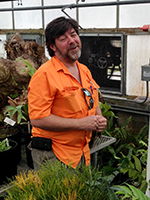 |
Mr. Reeps helped initiate a research program in the SEE Lab investigating the aquatic communities that form in purple pitcher plants. In addition to identifing wild populations in the area for future study and establishing a purple pitcher plant population in the Kresge Greenhouse at UNCW, Matt is began to describe the communities found in selected pitchers. The ultimate goal for this research is to use these natural microcosms as model ecosystems to test ecological hypotheses about community and ecosystem organization and development.
|
||
| Tanner Schwarz | BS Biology, 2016 | ||
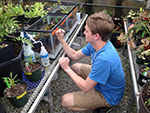 |
Mr. Schwarz collaborated with Mr. Reeps on establishing the purple pitcher plant resarch program in the SEE Lab. Mr. Schwarz conducted seed germenation experiments. After graduation, Mr. Schwarz started gradutate school at NCSU.
|
||
| Sarah Jonhson | BS Biology, 2016 | ||
Ms. Johnson assisted with the UNCW Purple Pitcher Plant Population, and estimated the size of a population of Sundews (Drosera brevifolia) growing on campus. She estimated that he poulation included over 6,000 individuals!
|
|||
| Amanda Valois | |||
In the of Fall 2017, Ms. Valois investigated a population of dwarf sundew (Drosera brevifolia) on the UNCW campus. She censused the population, building on the previous work of Sarah Johnson, and estimate the population growth rate. She estimated that the population contained ~7,000 individuals!
|
|||
| Evan Anway | M.S. Biology, May 2018 |
||
Mr. Anway is interested in the overarching constraints on life in ecosystems: what are the broadest processes that ultimately limit life? For his Masters thesis, he is studying how resource availability and trophic complexity affect mean body size and total biomass by altering metabolic constraints. This research is being conducted using the aquatic micro-ecosystem inside the pitcher of Sarracenia purpurea (purple pitcher plant), which provides a model ecosystem for laboratory experiments and a naturally-occurring analog for comparison.
Borrett, S.R., L. Sheble, J. Moody, A.E. Answay. 2018 Bibliometric reveiw of Ecological Network Analysis: 2010-2016. Ecological Modelling 382:63–82. doi: 10.1016/j.ecolmodel.2018.04.020 Next Step: Staff Scientist at ERM: Environmental Reseources Managment
|
|||
| Jessica Gribble | BS Biology, May 2018 |
||
Ms. Gribble worked on a Directed Independnet Study during Summer 2017 and Spring 2018. She investigated the impact of indirect effects in ecosystems on the relative importance (throughflow centrality) of the system actors. Ms. Gribble's next step was to pursue a Masters degree in education. |
|||
| Sarah Brewster | BS Marine BIology, May 2018 |
||
For her Honors Thesis, Ms. Brewster used Ecological Network Analysis to investigate the ecosystem impacts of shirmping on Core Sound, NC. |
|||
| Hunter Synan | BS Biology, May 2018 |
||
Mr. Synan investigated the statisistial dependencies among the many ENA whole system metrics, with the goal of using the information to guide decision making on a reduced set of metics to report. Hunter's next step was graduate school in geosciences at UNCW |
|||
| Sallie Mathis | BS Biology, 2018 | ||
Ms. Mathis first conducted a Directed Independent Study (DIS) investigating the use of the keystoneness concept in Ecological Network Analysis to determine the relative importance of species in food webs. In a second DIS she learned about the biology and ecology of carniverous plants. She also served as an undergraduate Teaching Assistant for Dr. Borrett's Ecology course during the summer of 2018. |
|||
| Lindsey Bockover | BS BIology, 2018 |
||
Ms. Bockover is investigated the food web that forms inside the leaves of purple pitcher plants. This work is in collaboration with Dr. Long and Dr. Cahoon. |
|||
|
|||

